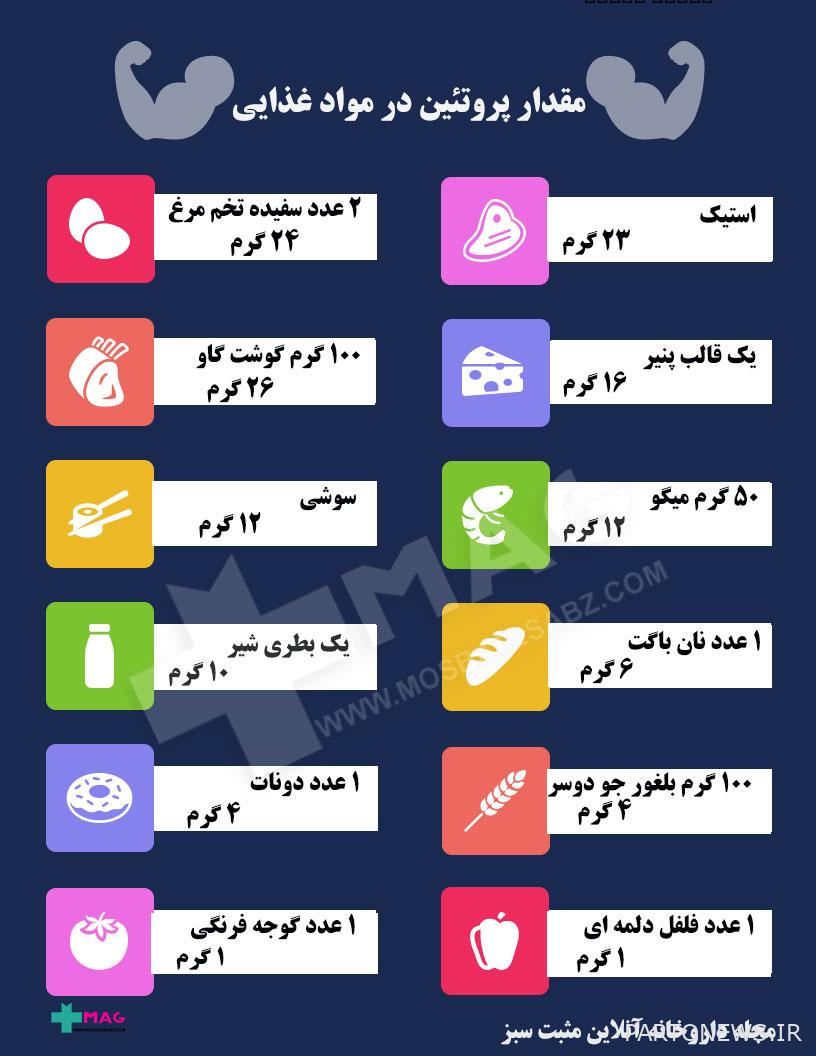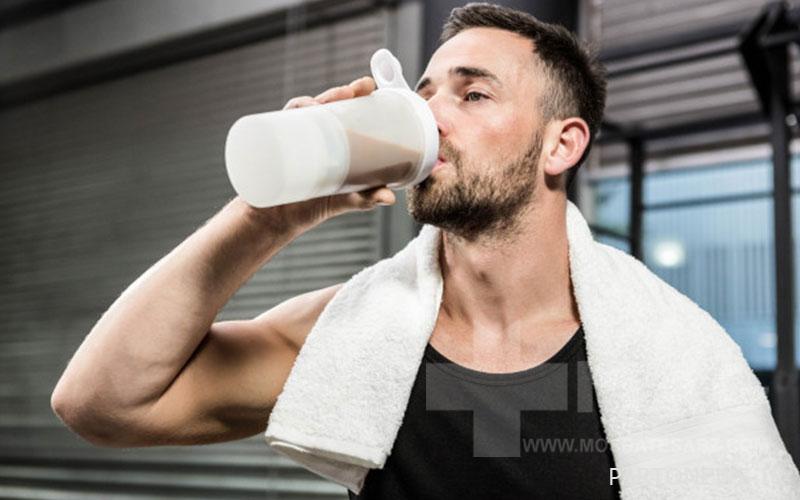What is the most important role of protein in bodybuilding? (daily intake of protein)

Most people who go to sports and bodybuilding are aware of the importance of protein consumption and its role, but they do not have detailed information about the role of protein in bodybuilding and its function; Protein is a word with Greek roots and means the first place, which shows its importance and role in the diet.
In the rest of the article, we are going to talk about the question of what is the most important role of protein in bodybuilding and the benefits of protein in bodybuilding and what is protein, so stay with us until the end of the article. Have you ever used a bodybuilding supplement to provide your body with the protein it needs?
What is protein?
Before addressing the issue of what is the role of protein in the body, let’s discuss the nature and definition of protein; For easier understanding, you can consider protein as a long chain of beads, each bead is an amino acid.
In general, the number of twenty amino acids help to form different proteins in the body and form a long chain by joining each other; Proteins have various functions in the human body, most of which are inside the cell.
One of the most effective proteins recommended by experts in this field to bodybuilders and people who want to consume more protein is whey protein because, in addition to its impressive effects, this protein has a high absorption and digestion power.
What is the most important role of protein in the body?
What is the role of protein in the body and bodybuilding? In the rest of the article, we are going to discuss the most important role of protein in the body; Among the functions of protein in the body, the following can be mentioned:
Growth of body tissues and its maintenance
One of the most important roles of protein in the human body is the growth and maintenance of body tissues; Proteins are constantly circulating in the structure of the human body, therefore, under normal and favorable conditions, the human body uses a certain amount of protein for growth, repair, tissue construction and maintenance.
In some cases, the body breaks down more than the required amount of protein to repair and build tissue, for this reason, the body finds a strong need for protein, for example, people who are in the period of illness, pregnancy and breastfeeding, middle-aged people and bodybuilders and Athletes, as well as people who need surgery due to illness, need more protein than other people, that’s why the role of protein in bodybuilding is obvious to everyone.

Aid in biochemical reactions
Biochemical reactions inside and outside the cells are carried out with the help of enzymes, the structure of this type of protein is in a way that gives them the opportunity to combine with other molecules that are inside the cell called substrate and carry out specific and necessary reactions for Build the body’s metabolism.
Enzymes are proteins that may also perform functions in the outer part of the cell, for example, enzymes such as lactase and sucrase in the digestive system cause sugar digestion; Some other enzymes need other molecules such as vitamins and minerals to carry out biochemical reactions.
In general, some functions of the body require the presence of enzymes, and if these enzymes are lacking, they will lead to disease; Among the functions of the body that depend on the presence of enzymes, the following can be mentioned:
- Digestive process
- Produce the energy needed by the body
- blood clotting
- Muscle contractions
Strengthen the immune system
Improving the function of the body’s immune system is one of the most important roles of protein in the body and it deals with infections, in fact, different types of proteins help the body to make antibodies needed to fight infections; Antibodies are a type of protein that exists in human blood and protect the body from factors that cause disease such as viruses and bacteria.

When the antibodies required to fight pathogens such as bacteria and viruses are not present throughout the body, these bacteria and viruses spread in the body and prolong the course of the disease, but when the body starts to make antibodies against bacteria and viruses. makes it special, the cells remember the method of making it, and the next time when pathogens invade the body, due to the knowledge of the method of making and the presence of antibodies, the body will quickly fight against these pathogens, in the same way, the role of protein in An increase in the body’s immunity is revealed.
Maintaining and adjusting the pH at appropriate levels
The role of protein in regulating and maintaining pH as well as the concentration of appropriate amounts of acids and bases in blood and other fluids is very impressive. As you know, the balance between acids and bases is measured by a scale called PH, which ranges from 0 to 14. The closer the pH is to zero, the more acidic the environment is, and the closer the pH is to 14. The environment will be more alkaline, and in the meantime, the neutral environment appears when the pH is set to 7; In the rest of the article, for a better understanding of the topic, we describe examples of PH in different materials:
- Stomach acid with PH2
- Coffee with PH5
- Tomatoes with PH4
- Blood in human veins with PH4
- Water containing soap with PH12
Since the disequilibrium Ph It can be fatal in the body, it is better to be diligent in maintaining its balance; Consuming proteins such as hemoglobin plays an important role in regulating pH, if you plan to use protein as a bodybuilding supplement, it is better to be aware of the amount and method of consumption so that it does not cause side effects.
Chemical messengers
Among the most important roles of protein in the body, we can mention hormones that play the role of chemical messengers in the body and help the communication between cells, tissues and organs of the body. Proteins that exist as chemical messengers in the body are made by endocrine glands and body tissues.
Proteins made in the body are transported to other organs and systems of the body through the bloodstream, where they are connected to cell surface receptors; Hormones are classified into three different categories: proteins, steroids, and amines, which make up most of the body’s hormones.
Shaping the structure of cells
Shaping the structure of cells and tissues and strengthening them is a role of protein in the body, among the proteins that make the tissue and cells stronger in the form of strands, we can mention keratin, collagen and elastin.
Keratin has many effects on the skin, hair and nails, collagen is present in the structure of bones, tendons, ligaments and skin and its role is very important; It is interesting to know that collagen is the most abundant protein in the human body.
Maintaining fluid balance in the body
Another role of protein in the body is to maintain the balance of fluids. Protein is responsible for regulating various processes in the body, and as a result, through these functions, it maintains the balance of body fluids. Albumin and globulin are proteins in the blood that help maintain fluid balance by absorbing and retaining water. If the protein storage in the body is not enough, the two proteins mentioned in the article are not capable of keeping blood, that’s why swelling and pain come to humans due to the accumulation of fluids in the intercellular spaces.
Storing nutrients and transporting them
Another case of the role of protein in the body is to carry substances in the bloodstream and deliver them inside or outside the cell, these substances include sugar, oxygen, cholesterol, vitamins and minerals; For example, one of the proteins that transports oxygen from the lungs to different body tissues is hemoglobin. Ferritin is a protein that has the role of storing iron in the human body, as mentioned earlier, the role of protein is to transport nutrients and store them in the body.

Providing the energy needed by the body
The most important role of protein in the body is to provide the required energy; It is interesting to know that there are approximately 4 calories in each gram of protein, and protein is the last substance that the body uses to provide energy.
In general, fats and carbohydrates are more suitable for providing energy compared to proteins, but in the case of fasting, the body breaks down skeletal muscle using amino acids to provide the energy needed by the body, also after exercise. The amount of protein in the body decreases and it is better for bodybuilders to use bodybuilding supplements containing protein.
The amount of protein needed at different ages
Not getting enough protein in the diet will lead to disorders in human health. In this case, tissues are broken down and muscles are lost. This does not mean that you should consume too much protein. In general, it is better to consume protein in the following amounts at different ages:
- Children under 4 years old: 13 grams
- Children 4 to 8 years old: 19 grams
- Children from 9 to 13 years old: 34 grams
- Girls over 14 years old: 46 grams
- Boys from 14 to 18 years old: 52 grams
- Men 19 years and older: 56 grams
Please note that the above values are approximate and the exact amount of protein should be determined based on weight and intensity of physical activity.
Symptoms of protein deficiency in the body
Until this part of the article, you have understood the role of protein in the body and its importance, consuming enough protein at different ages can prevent protein deficiency. Millions of people around the world suffer from protein deficiency, which is mostly seen in Central Africa and South Asia. In the rest of the article, we are going to discuss the common symptoms of protein deficiency; These symptoms include:
- Major disorders in muscle building and loss of muscle mass
- Abdominal enlargement
- Fatty Liver
- Stunting in children
- skin problems
- Brittle nails
- Hair loss and thinning
- Continuous fracture of bones

Table of protein content in plant sources
In this table, you can see the amount of protein in some plant sources to better understand the importance of the role of protein in the body:
| The name of the food item | amount (grams) | Amount of protein (grams) |
| spinach | 435 | 12.4 |
| soybeans | 68 | 8.8 |
| Broccoli | 295 | 8.3 |
| Lettuce | 550 | 7.3 |
| Kale | 200 | 6.6 |
| tomato | 555 | 4.9 |
| Red cabbage | 323 | 4.3 |
| Red bell pepper | 323 | 3.2 |
| carrot | 245 | 2.3 |
The above table can be a good guide for vegetarians. By consuming these substances, the role of protein in the body will be done well.
final word
The role of protein in the body is not the only one. In this article from the online positive green pharmacy magazine, we mentioned the most important role of protein in the body and bodybuilding. This substance has different functions in the human body, the most important of which we mentioned in this article. According to your age, include the right amount of protein in your diet every day so that you don’t face a deficiency. Also, if you are an athlete, consult your trainer about taking bodybuilding supplements.
Frequently asked questions about the role of protein in the body
Where is protein made in the body?
Protein production in the cell occurs when DNA molecules transfer the genetic code for the synthesis of amino acids to other molecules such as RNA and ribosomes. The liver is one of the most important organs for making protein, where millions of protein molecules are produced or converted every day. Proteins are made of amino acids.
What are the properties of protein?
Protein provides the necessary energy for the body and plays a role in supplying oxygen to the organs. Protein also helps make antibodies that are needed to fight infections and diseases.
What is the best protein supplement?
Protein can be supplied in the form of supplements from various sources. According to experts, whey protein is one of the best types of protein that can be obtained from milk. Bodybuilders usually use this supplement to help build muscle.
How much protein should we consume daily?
If you are moderately active, eat 1 gram of protein per 1 kilogram of your body weight. But if you are an athlete, you can double this amount.
What are the side effects of consuming too much protein?
If you eat more than the recommended amount of protein every day, you may experience side effects such as excessive thirst, loss of appetite, headache, fatigue, bloating, nausea and other digestive problems.
What is the role of protein in bodybuilding?
One of the big goals of every bodybuilder is to keep fit and build muscle. Muscles need protein for growth and repair. Proteins are made from amino acids.
What are the properties of protein for hair?
Hair strands are made of protein. Sufficient protein in the diet helps to strengthen and keep hair healthy. A very low protein diet leads to hair loss and brittle hair.
Please rate this article
[مجموع: ۵ میانگین: ۳.۶]


